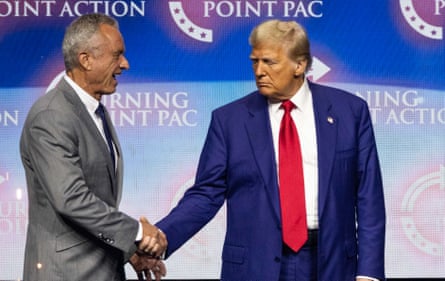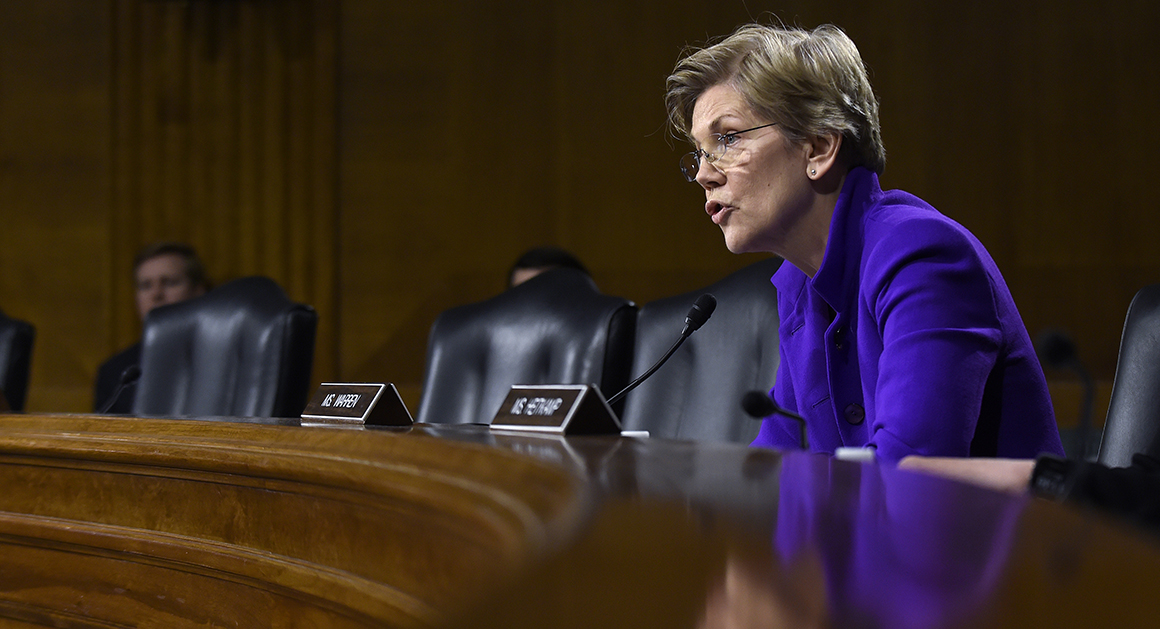“Welcome back,” Joe Biden told Donald Trump, his predecessor and successor, as the pair shook hands in the Oval Office. For Biden, it was important to show the world that America can still conduct a peaceful transfer of power. “A transition that’s so smooth it’ll be as smooth as it can get,” Trump said.
It was an outward show of permanence and stability. But behind the two men a fire was burning fiercely in the grate. TV comedian Stephen Colbert observed: “I do think it was fitting that they held the meeting in front of a roaring metaphor for the future.”
Trump will not be president for another two months but he is already dominating the Washington agenda again. This week a flurry of controversial and extremist picks for his cabinet and other high-ranking administration positions came at a hectic pace and with a level of provocation that made heads spin.
The choices included a Fox News host, a tech billionaire, an anti-vaccine activist, an alleged apologist for Russia’s Vladimir Putin and a congressman once embroiled in a sex-trafficking investigation. The lineup raised fears of authoritarianism or chaos – or both – once Trump and his allies are back in the Oval Office.
Tara Setmayer, a former Republican communications director on Capitol Hill, said: “Their entire political brand is shock and awe. Prior to Trump’s re-election it was notional. Now they have the power to execute all of their depravity with the full backing of American government power virtually unchecked. I don’t think the people who voted for Donald Trump, allegedly because of economic angst, have a full appreciation for what that means.”
Trump, who has promised not to be a “dictator” except on “day one”, will enter office with far fewer guardrails and checks on his power than last time. He will return to Washington with a Republican-controlled Congress and a conservative supreme court, containing three justices he appointed, that ruled he is largely immune from prosecution.

He has said of his day one plans: “I want to close the border, and I want to drill, drill, drill.” The immigration issue animated his successful election campaign, often couple with racist rhetoric and falsehoods. Trump’s press secretary, Karoline Leavitt, told Fox News: “We know that on day one he is going to launch the largest mass deportation of illegal immigrants in American history.”
To make it happen he is bringing back Tom Homan, the acting director of Immigration and Customs Enforcement during his first administration, as his “border czar”. Homan, 62, has said he will prioritise deporting immigrants illegally in the US who posed safety and security threats as well as those working at job sites.
He will receive zealous ideological backing from Stephen Miller, deputy chief of staff for policy. An immigration hardliner, the 39-year-old was a vocal spokesperson during the presidential campaign for Trump’s priority of mass deportations. At a rally at Madison Square Garden in New York, he adopted nativist language as he asserted that only Trump would stand up and say “America is for Americans and Americans only.”
Trump also announced that Kristi Noem, the governor of South Dakota, will serve as the next homeland security secretary, responsible for everything from border protection and immigration to disaster response and the Secret Service. Noem, 52, rose to national prominence after refusing to impose a statewide mask mandate during the coronavirus pandemic.

A mass deportation effect could face logistical problems as well as a barrage legal challenges from immigration and human rights activists. But when Trump takes the oath of office on 20 January, his team will be expected to hit the ground running.
Larry Jacobs, director of the Center for the Study of Politics and Governance at the University of Minnesota, said: “The world needs to strap in because the first day of the Trump administration has been in the planning for at least a couple of years and so the white papers, the executive orders are already in files and ready to be pulled out.
“We can expect certainly that some of the most radical ideas about curtailing immigration into the United States and then the expelling of unauthorised immigrants within the United States will get a boost from the president making a speech or a press conference followed up with directives to the executive branch. That’ll be off and running day one.”
Jacobs added: “We can also expect a pretty sharp attack on the independence of the judiciary. This is going to be a rupture in the generations-old practice of political independence in terms of the Department of Justice. That’s coming to an end.”
Trump has long said the biggest mistake of his first term was choosing the wrong people. He had arrived in Washington as the first president without prior political and military experience and relied on others for personnel recommendations. He felt frustrated at and betrayed by officials who slow-walked or ignored directives they saw as ill-advised.
Having beaten Vice-President Kamala Harris in the 5 November election, Trump is determined to avoid that mistake second time around. His blitz of announcements this week shows the premium he places on absolute loyalty.
His early to-do list could include imposing sweeping tariffs on imported goods, pardoning supporters involved in the 6 January 2021 insurrection at the US Capitol, pulling the US out of the Paris climate agreement, reversing protections for transgender students in schools and fulfilling his campaign promise to end the war between Ukraine and Russia “in a day”.
Some have been relatively mainstream selections reassuring to the political class. They include Susie Wiles, 67, who will be the first woman to serve as White House chief of staff, and Senator Marco Rubio, 53, now in line to become the first Latino in the role of secretary of state. Rubio is seen as a foreign policy hawk who has previously taken a hard line on foes including China, Iran and Cuba.

Elise Stefanik, 40, a Republican congresswoman and staunch Trump supporter, has been named as Trump’s ambassador to the United Nations. Mike Waltz, 50, a Republican congressman and retired Army Green Beret, is set to be his national security adviser. And John Ratcliffe, 59, a former director of national intelligence, will serve as director of the Central Intelligence Agency.
But other picks have almost seemed to be political performance art, designed to goad and outrage Democrats (“owning the libs”) and impose a loyalty test on the Senate Republicans who will have to decide whether to confirm or reject Trump’s cabinet members, judges and ambassadors.
On Tuesday night Trump picked Pete Hegseth as his defence secretary. The 44-year-old is a co-host of Fox & Friends Weekend on Rupert Murdoch’s conservative Fox News network and once said he “hasn’t washed hands in 10 years” because “germs are not a real thing”. Hegseth, a military veteran, has opined that women should not serve in combat and expressed disdain for the so-called “woke” policies of Pentagon leaders.
after newsletter promotion
In his recent book, The War on Warriors: Behind the Betrayal of the Men Who Keep Us Free, Hegseth wrote: “The next president of the United States needs to radically overhaul Pentagon senior leadership to make us ready to defend our nation and defeat our enemies. Lots of people need to be fired.”
A day later Trump named Tulsi Gabbard, 43, a former Democratic congresswoman and critic of the Biden administration, as his director of national intelligence. Gabbard served in the army national guard for more than two decades, deploying to Iraq and Kuwait. But she secretly met with Syrian dictator Bashar al-Assad in 2017 and blamed the US and Nato for Russia’s invasion of Ukraine in 2022.

Rick Wilson, a co-founder of the Lincoln Project, an anti-Trump group, said: “So far the candidates range from the unserious to the terrifying. Tulsi Gabbard is going to send a shock wave through the intelligence community and not in a good way. I can tell you that her Putin sympathies being rather evident to everyone around her is going to become a major issue. I’m not sure Tulsi Gabbard can be confirmed.”
Perhaps most outlandish, Trump selected Matt Gaetz, a Florida congressman and “Make America great again” provocateur, for attorney general. The position of America’s top law enforcement official is potentially central to his plans to carry out mass deportations, pardon January 6 rioters and seek retribution against those who prosecuted him over the past four years.
The decision prompted howls of derision and doubts over whether Gaetz, 42, will receive Senate confirmation. He was once the subject of a justice department investigation into sex-trafficking allegations involving underage girls, although it ended last year with no federal charges against him.
The staunch Trump loyalist was also under scrutiny by the House ethics committee over allegations including sexual misconduct, although that investigation in effect ended on Wednesday when Gaetz resigned from Congress. Republican and Democratic senators on the judiciary committee that would review Gaetz’s nomination are calling for the findings to be made available to them.
Senator Dick Durbin, the Democrat who currently chairs the judiciary committee, said Gaetz “would be a disaster” in part because of Trump’s threat to use the justice department “to seek revenge on his political enemies”. John Bolton, a former national security adviser to Trump, described it as “the worst nomination for a cabinet secretary in American history”.
Then, on Thursday, Trump delivered the coup de grace by saying he will nominate Robert Kennedy Jr, 70, to lead the Department of Health and Human Services. Kennedy is one of the most prominent anti-vaccine activists in the world. Long advancing the debunked idea that vaccines cause autism, he has said vaccines have caused a “holocaust” and travelled the world spreading false information about the Covid-19 pandemic.

Kennedy, the nephew of President John F Kennedy, has also said he would recommend that water agencies stop adding fluoride to drinking water and made a variety of other claims not backed by science, such as questioning whether HIV causes Aids and suggesting antidepressants lead to school shootings.
Adding to the mix, Trump named Mike Huckabee, 69, as ambassador to Israel. He has rejected a Palestinian homeland in territory occupied by Israel, calling for a so-called “one-state solution”. He has also denied that the West Bank, seized by Israel from Jordan in the 1967 six-day war, is under military occupation.
Meanwhile the tech billionaire Elon Musk, 53, a campaign surrogate and increasingly close ally, and entrepreneur Vivek Ramaswamy, 39, will lead lead a newly created Department of Government Efficiency. Trump said the pair will reduce government bureaucracy, slash excess regulations, cut waste and restructure federal agencies.
Newt Gingrich, a former Republican speaker in the House of Representatives, defended Trump’s team selection as an effort to bypass the establishment. “Einstein once said, thinking there’ll be a different outcome by doing the same thing over and over again is a sign of insanity,” he said.
“We’ve been told now for decades that the American people think we’re on the wrong track. We keep hiring people who are marginally more off the track a half-inch and we get the same result. Well, Trump is going to move the track by many feet.”
But the rapid-fire onslaught has left many in Washington dazed and confused about the prospect of Trump’s first day in office. Setmayer, co-founder and chief executive of the Seneca Project, a women-led super political action committee, said: “I expect chaos and a series of constitutionally questionable actions exponentially worse than what we saw on day one last time. It’s already started. There will be many of us who said, we warned you.”
She added: “The Trump administration is going to plunge America into a cross between The Hunger Games and The Celebrity Apprentice, unfortunately at great expense to the future of our democracy and the humanity of millions of Americans who will suffer at the hands of this gallery of degenerates. The American electorate fucked around and now they’re going to find out.”

 German (DE)
German (DE)  English (US)
English (US)  Spanish (ES)
Spanish (ES)  French (FR)
French (FR)  Hindi (IN)
Hindi (IN)  Italian (IT)
Italian (IT)  Russian (RU)
Russian (RU)  2 hours ago
2 hours ago






















Comments